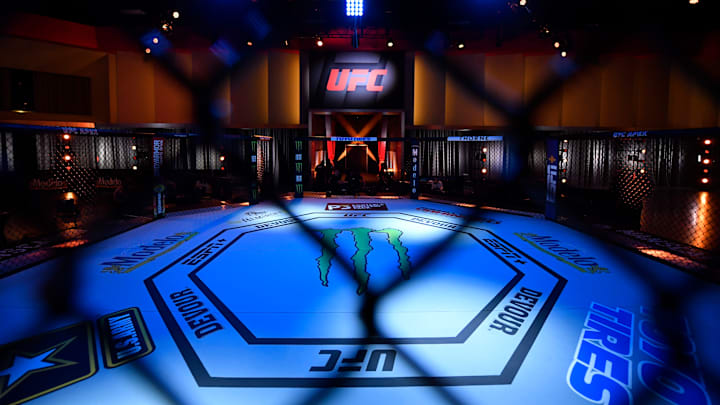The merger between the UFC and WWE created some intriguing business opportunities. While most discussed the crossover between the two brands, there was a need to talk more about the business impacts. What would the two companies take from each other? There have already been some developments in those areas, and news on Monday revealed that WWE is set to host an NXT PLE from the UFC APEX in June. While most presented excitement around the news, there should be some caution when analyzing what the move means as well.
NXT Battleground is set to hail from the UFC APEX on June 9. The APEX is the UFC’s production center that is used to broadcast Dana White’s Contender Series, smaller MMA events, and Power Slap.
“We are always exploring new frontiers to showcase NXT and we are excited to bring Battleground to this world-class production facility in partnership with UFC,” said WWE Senior Vice President of Talent Development Creative Shawn Michaels in a statement to ESPN.
But that move should also raise some alarms. The UFC APEX was a pivotal part of UFC’s ability to survive during the COVID-19 pandemic. While most sports and entertainment firms were forced to shut down, UFC looked inward to create this self-sufficient center to continue to host events. Did it stop several fighters from contracting COVID-19? No. But what it did was allow the UFC to meet contractual obligations for content while putting on shows, making sure the bottom line remained intact.
As soon as the world opened back up, many expected the UFC to go back on the road, taking its presentation of MMA to major cities in the United States and beyond. Instead, what the company has done is to continue to present much of its content from the APEX. In the eyes of many this has watered down the product in such a way that much of said action has become meaningless.
“I don’t know why any of us are doing it,” said former UFC contender Kevin Lee in a 2023 interview on Morning Kombat. “I guess it’s probably for the money, but it seems like the UFC is making plenty of money these days. Part of the appeal of being a martial artist is traveling the world and fighting. I just don’t want to get away from that, just for the money. It seems like we’re killing the sport for money, and I’m not cool with that.”
near-endlessThe APEX has allowed UFC to create a near endless stream of monetizable content, regardless of the quality of said action. Take complaints back in March from a previous UFC APEX showcase that featured zero ranked fights, one ranked fighter, nine coming off losses, 19 from either the Contender Series of The Ultimate Fighter and five fighters making their UFC debut. There was even a recent show that Facebook creator, Mark Zuckerberg rented out that kept media members away, but the UFC wouldn't reveal that as the real reason. It just isn’t the quality that fight fans of yesterday remember.
So, what does this mean for the WWE? The biggest wrestling company in the world already has a similar facility in Orlando with the Performance Center. Several PLEs have broadcast from that venue and it was its hub for wrestling for a moment early in the COVID-19 pandemic. But since then, WWE has gone back out on the road, taking talent on its house show loop from all three brands. But is there a chance that can all go away to better service the bottom line?
House shows and touring have long been a loss leader for WWE. The practice of going to cities across the country and sometimes overseas hasn’t brought in the same type of revenue as in the past, but it’s still a valuable aspect of wrestling. Especially for getting performers valuable reps. Yet, one thing Endeavor does very well is protect the bottom line. This is one reason UFC is listed as the most lucrative combat sports organization in the world. If many of those business practices transfer over to the WWE, there’s a serious chance the product can look quite different in the years to come.
Look at WrestleMania XL as an example. Logan Paul’s PRIME sports drink was a big center-ring advertisement, the first of its kind. While even more ads show up on ring posts and LED boards on the sides. Some fans complained about it, but this pales in comparison to the advertising space offered in the Octagon. It would be bad business for WWE to not look at the potential revenue that can come in from selling off mat space. But what perception will that leave for the fans watching at home? Will that put more money in the pockets of the performers? Probably not. It hasn’t been for the UFC roster.
There’s a lot to take away from WWE and UFC merging forces. Instead of talking about whether fighters will show up in the pro wrestling world or if wrestlers will make the jump to MMA, media outlets should pay attention to the behind-the-scenes business which can truly impact how things are done long term.
